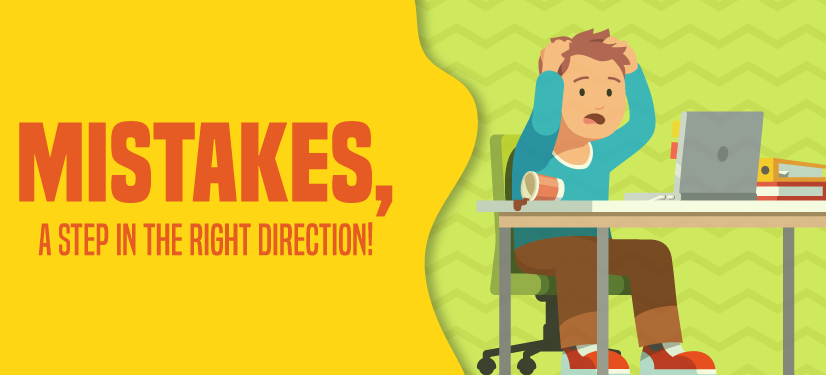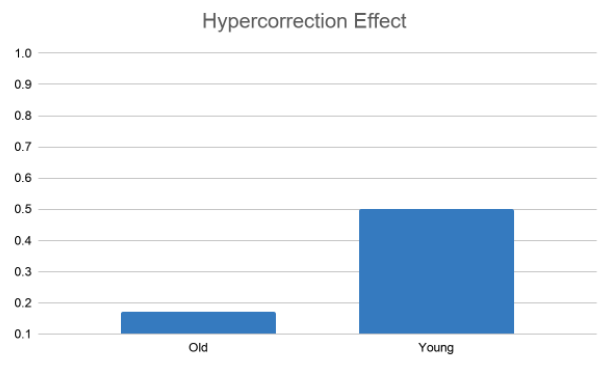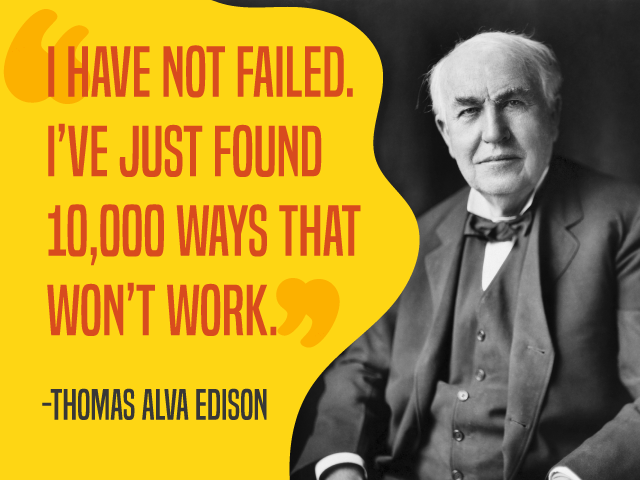When was the last time you made a mistake? Just as much as it might sound absurd, research suggests that making mistakes are good. Be warned though, when we say mistakes we don’t mean breaking the law! What we mean by mistakes are those decisions and acts that we do in our day to day lives that may not have been the best possible choice.
When we talk to people, in our communication, in our studies, in our management of situations, in our interactions with others and a host of other things we tend to err.
The great thing about making mistakes is that we humans tend to remember them very accurately and try to avoid repeating them the next time. This gives way to a solid learning experience.

Have you seen a child trying to take his/her first steps? Children fall a number of times. Sometimes they even get hurt but that doesn’t stop them from trying. If they had quit very early on then they would not have learned to walk in their lives.
There is a lot we can learn from young children. They are not afraid of making mistakes. Some people attribute this partly to their innocence. Unlike adults, they do not care about what people think and hence they are not afraid of failure.
As we grow old we become cautious and a little too cautious at that. This overprotective and defensive mind mechanism forces us to consider all possible outcomes when making a decision.
Although a little bit of this might be a good thing, overdoing it could stop all our projects in their tracks even before it gets a chance to take off. This is what some call Analysis Paralysis.
We humans tend to make mistakes. It is what makes us human after all. Nothing backs this claim better than the old age saying
“To err is human, to forgive divine,” by Alexander Pope.
This is perhaps one of the most overused proverbs as far as human mistakes are concerned.
If you talk to any successful entrepreneur, scientist, politician or athlete they all have the same thing to say about mistakes: that they are inevitable and that they play a very crucial role in achieving success later in their careers.
We learn a lot from our own mistakes rather than from the mistakes made by other people. No matter how much we learn about other people and their experiences we tend to not understand them fully. This is because we as human beings are hot-wired to learn from our past, our actions and above all, our faults rather than learning from other sources.
Being practical and emotionally occupied by our decisions or acts, these choices tend to get engraved in our minds. Memories of these events come to our rescue when we are put in a similar situation by helping us make the right choice.
Remember that mistakes are the first steps in the right direction when it comes to learning something new. These faults decide many of our future actions and how we interact with society as well. Let’s elaborate. Why is it that a small child is never too cautious about making errors? The answer is pretty simple. They are innocent and hence do not give heed to what other people think.
That’s the reason why children have very steep learning curves in pretty much everything they do. Adults don’t even come close. You see, you have an edge over grownups!
As students, you should be curious and excited about discovering and experiencing new things and this helps you to disconsider what other people think. It has been rightly said that as we grow, the child in us dies and so does the curiosity along with it. But this does not always have to be the case. You have the power to choose for yourself! We need to convince ourselves that no matter what other people think we have to keep trying and embrace our failures gracefully.
We have got to learn to tame our egos and move on. We also need to retain that child in us. So the next time you end up making a mistake, just relax. Don’t panic! Learn from your mistakes and make a course correction every time you make one.
Remember: don’t be afraid to try something new or creative just out of the fear of making a mistake. That’s when the growth happens.
What is the hypercorrection effect?
This is a theory that has been tested and proven by researchers. To put it in simple terms the theory states that errors committed with a high level of confidence are more likely to be corrected than those errors committed with a lower level of confidence.
Interestingly this theory has been proven a number of times repeatedly with both children and young adults as participants. What’s more interesting is that even a wrong answer is better than a “no answer”.Your brain has a tendency to overcompensate when you make mistakes and this is what is being exploited for better learning.
Recently there was a study conducted on analysing “the hypercorrection effect in younger and older adults”. The paper helps us better understand the term and its effects on children and adults.What makes it very interesting is the stark difference between these two categories of participants.
Let’s break down the research using a simple graph:

In the above graph, a positive value shows hypercorrection whereas a zero value indicates no hypercorrection. As can be seen, younger people tend to display a much higher level of hypercorrection as opposed to older people.
One possible explanation could be because young people are inexperienced and curious at the same time. They are easily surprised and excited by the results of their choices.
Whatever the result of their choice, they give it good thought. When it comes out to being wrong they are perplexed and want to find out what the right answer is, and why. The sheer curiosity and desire to know engraves the right answers in their mind.
It’s almost like they never forget their mistakes. That could very well be the basis for this effect.
Unlike youngsters, adults are more experienced and mature. They are not easily surprised by the results as a result of their choices. And this could be one of the reasons for events not so easily registering in their minds.
Did you know that AI learns from mistakes just like us?
Some of us are of the view that computers can never make mistakes. In today’s world, nothing could be further from the truth.
Here is an overly simplified explanation of this. Artificial Intelligence or AI in short is a very fancy term. But there is a lot to it other than what meets the eye. AI is essentially software that mimics intelligence in some form and they actually learn from their mistakes much like us.
Surprised? What is even more interesting is that they can learn from the choices that they make independently or through the help of a guide or a teacher who is actually another human being.
So you see even computers need to make their fair share of mistakes to get the ball rolling. And the best part, they have no emotional baggage holding them back from making those mistakes unlike us humans.
What Robin Sharma has to say about mistakes:
World-renowned leadership expert and writer Robin Sharma himself came out with all guns blazing when he said: “There are no mistakes”. There’s a lot to that statement that’s easy to miss. He believes that mistakes are a great source of learning. One of the best ways to gain awareness, understanding and precious knowledge is actually making mistakes on your own.
He very elegantly calls mistakes “growth lessons in wolf’s clothing”. One can imagine why. According to Sharma, the person who makes the most mistakes wins the most.

A fitting ending to this piece would be the words of the great inventor Thomas Edison. Before perfecting the lightbulb, Edison experimented with thousands of substances to make the best possible bulb. His immortal words are a tribute to the process of making mistakes:
“I have not failed. I’ve just found 10,000 ways that won’t work.”
-Thomas Alva Edison
We hope these words inspire you to face the challenges of today in order to meet the demands of tomorrow. So let’s roll up those sleeves and get busy making some MISTAKES, alright?
Rohit is someone who fell in love with the word – change. And if there is one thing that he hates, it’s a boring and repetitive life. He loves learning new things and believes that it is a lifelong process. He also enjoys research, reading and reducing most things that he comes across to numbers!
Comments
Samarth Mengale
January 13, 2021
This guidance is helpful for any student……. I like this information
Trisha
November 18, 2020
very true …… I get scolded almost every day by my parents for very small reasons. ???♀️ I take it very easy and remember not to repeat the same mistake again……
Parvathi Ajayakumar
November 17, 2020
Yes….your absolutely correct !!!!! ??? Thanks………. for the extra information !!!!!!!! ??